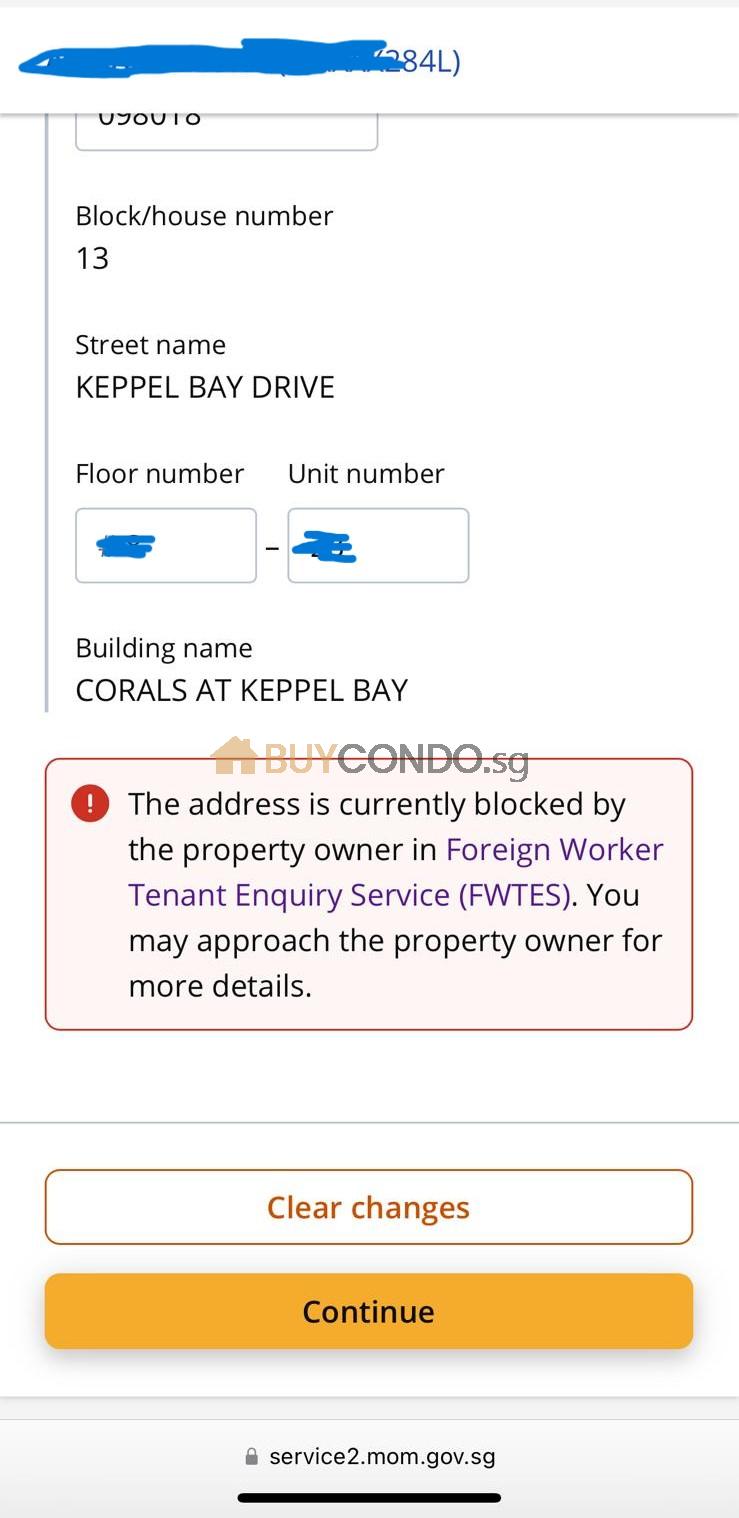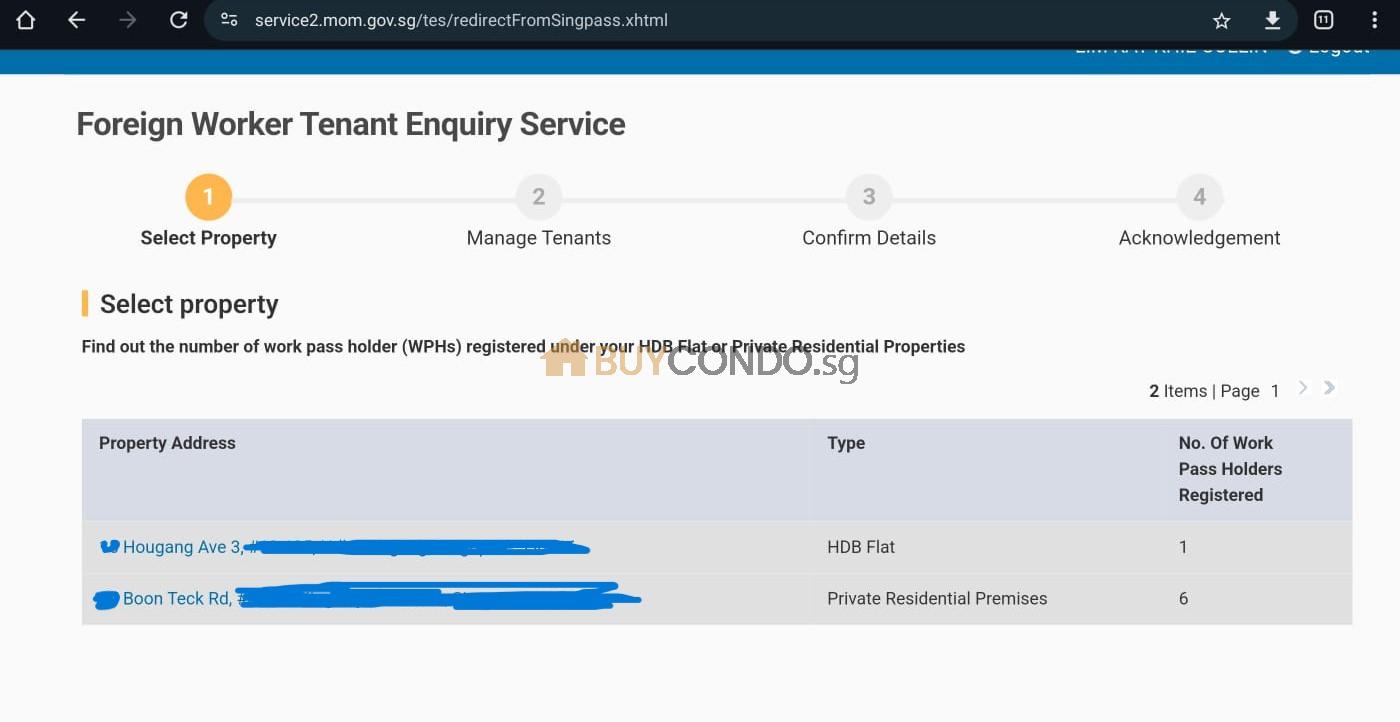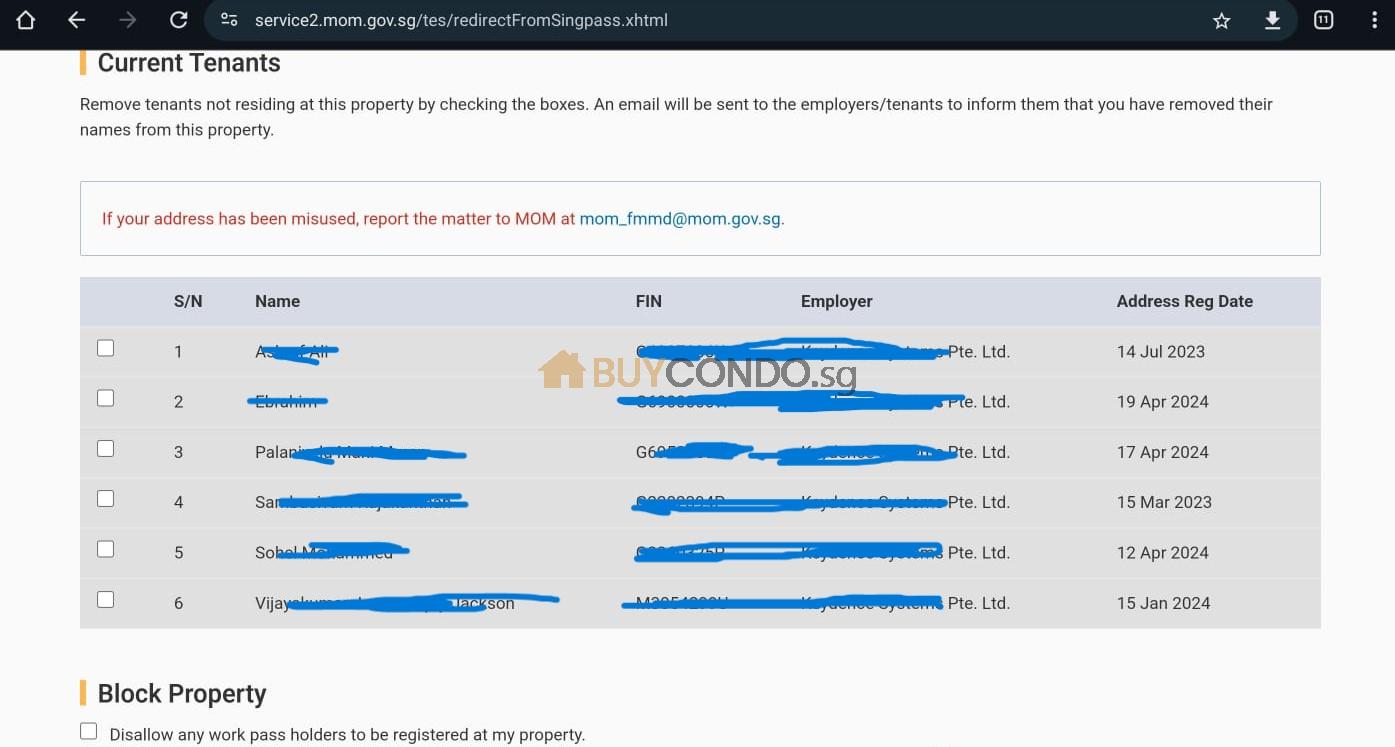Are you a landlord in Singapore renting out your Condo for the 1st Time?
Your potenatial tenant may be facing this problem below from MOM if you do not carry out this step.
Most Landlords or property agents ain’t aware of this.
When you are renting out your property for the 1st Time or you have just rented out your apartment.
The address is currently being blocked by the property owner in Foreign Worker Tenant Enquiry Service (FWTES).

For homeowner renting out the place for the first time, will be required to complete a one-time declaration process.


From understanding the basics of condo tenant registration to leveraging Singapore’s tenancy laws, I will provide you with the knowledge and insights you need to ensure a hassle-free experience. So, let’s dive in and discover how you can easily register a tenant in a Singapore condo!
Key Takeaways: Are you a landlord in Singapore renting out your Condo for the 1st Time?
- Registering a tenant in a Singapore condo requires following specific guidelines and regulations.
- Understanding URA’s tenancy guidelines for private properties is crucial for landlords in Singapore.
- Knowing the minimum stay duration and occupancy cap regulations is essential for a successful tenant registration.
- By leveraging Singapore’s tenancy laws, landlords can ensure a smooth tenant registration process.
- It’s important to navigate potential obstacles, such as phishing scams, and understand tenant rights during the registration process.
Understanding the Basics of Condo Tenant Registration in Singapore
Understanding the basics of condo tenant registration in Singapore is crucial for landlords and tenants alike. By familiarizing yourself with the processes and regulations involved, you can ensure a smooth and hassle-free experience. In this section, we will explore the Urban Redevelopment Authority’s (URA) tenancy guidelines for private properties, as well as the minimum stay duration and occupancy cap regulations.
URA’s Tenancy Guidelines for Private Properties
The Urban Redevelopment Authority (URA) has established specific guidelines for tenancy in private properties. These guidelines aim to maintain the quality of residential areas and protect the interests of both landlords and tenants. As a landlord, it is important to be aware of these guidelines and adhere to them during the tenant registration process. This ensures that your tenancy agreement is legally valid and provides clarity for both parties involved.
Minimum Stay Duration and Occupancy Cap Regulations
When renting out your condo in Singapore, it is essential to understand the minimum stay duration and occupancy cap regulations. The minimum stay duration refers to the minimum period of time that a tenant is required to stay in the condo. This regulation helps maintain stability within residential communities and prevents frequent turnover of tenants. On the other hand, occupancy cap regulations limit the number of occupants allowed in a condo based on its size and layout. These regulations help prevent overcrowding and ensure that the living environment is suitable for all residents.
| Tenancy Guidelines | Details |
|---|---|
| Minimum Stay Duration (3 Months) | Minimum period of time required for a tenant to stay in the condo |
| Occupancy Cap Regulations | Limits on the number of occupants allowed based on condo size. (6 ~ 8 Pax) |
Leveraging Singapore’s Tenancy Laws to Your Advantage
Understanding and leveraging Singapore’s tenancy laws is essential for both landlords and tenants. By staying informed about the regulations and guidelines, landlords can ensure a smooth tenant registration process and a successful rental experience. In this section, we will explore key aspects of Singapore’s tenancy laws that every landlord should be aware of.
Eligibility Criteria for Renting Out Your Condo
Before renting out your condo in Singapore, it is important to understand the eligibility criteria set by the authorities. These criteria determine who can rent out their property and under what conditions. By meeting these criteria, landlords can ensure that they are legally allowed to rent out their condo and avoid any potential penalties or legal issues.
Temporary Relaxation of Occupancy Caps for Larger Units
In certain cases, there may be a temporary relaxation of occupancy caps for larger units in Singapore condos. This means that restrictions on the maximum number of occupants allowed in a unit may be lifted for larger units. Landlords should stay updated on these temporary relaxations to maximize their rental potential and attract more tenants.
Understanding the Role of MCSTs in Tenant Registration
The role of the Management Corporation Strata Title (MCST) in tenant registration is crucial for maintaining the smooth functioning of the condo and ensuring compliance with regulations. The MCST is responsible for managing common areas, facilities, and maintenance services within the condo development. Landlords should work closely with the MCST to ensure a seamless tenant registration process and address any issues or concerns that may arise.
| Tenancy Law | Key Points |
|---|---|
| Eligibility Criteria | Ensure compliance with the criteria for renting out your condo |
| Relaxation of Occupancy Caps | Stay updated on temporary relaxations for larger units |
| Role of MCST | Collaborate with the MCST for a smooth tenant registration process |
Registering a tenant in a Singapore condo is generally a straightforward process, but it’s important to be aware of potential obstacles that may arise along the way. By staying informed and taking necessary precautions, you can navigate these obstacles effectively and ensure a successful tenant registration in your condo.
Watch Out for Phishing and Scam Attempts
One common obstacle in the tenant registration process is the presence of phishing scams and fraudulent activities. Fraudsters may attempt to deceive landlords by posing as potential tenants or official authorities, requesting personal information or financial details. To protect yourself, remain vigilant and follow these best practices:
- Always verify the authenticity of communications: Be cautious of unsolicited emails, phone calls, or messages requesting personal information or financial transactions. Verify the legitimacy of the sender before sharing any sensitive details.
- Avoid clicking on suspicious links: Phishing scams often involve deceptive links that lead to fake websites designed to gather confidential information. Double-check the URL and ensure it belongs to the official organization or platform.
- Secure your online accounts: Use strong passwords, enable multi-factor authentication, and regularly update your software to protect against unauthorized access to your accounts.
- Report suspicious activities: If you encounter any suspected phishing or scam attempts, report them to the relevant authorities, such as the police or the Singapore Computer Emergency Response Team (SingCERT).
Understanding Tenant’s Rights and Owner’s Liabilities
As a landlord, it’s crucial to have a clear understanding of tenant’s rights and your own liabilities to ensure a fair and harmonious rental agreement. Familiarize yourself with the following key points:
- Tenant’s rights: Tenants have the right to peaceful enjoyment of the property, privacy, and a safe living environment. As a landlord, you must provide necessary repairs, maintenance, and comply with relevant laws and regulations.
- Owner’s liabilities: Landlords are responsible for maintaining the livability and safety of the condo, ensuring compliance with building codes, and resolving any disputes that may arise during the tenancy.

Keeping Up with Tenant Registration Guidelines for Condo in Singapore
Staying informed about the latest tenant registration guidelines for condos in Singapore is essential to ensure ongoing compliance. The Urban Redevelopment Authority (URA) provides comprehensive tenancy agreement and registration process guidelines. Regularly check the URA website and other reliable sources to stay up-to-date on any changes or updates to the guidelines.
By keeping yourself well-informed and adhering to the prescribed guidelines, you can ensure a smooth and legally compliant tenant registration process for your condo in Singapore.
Conclusion
Registering a tenant in a Singapore condo is a straightforward process that can be easily accomplished by following the proper guidelines and regulations set forth by the Urban Redevelopment Authority (URA). By leveraging Singapore’s tenancy laws and understanding the essentials of tenant registration, landlords can ensure a smooth and successful process.
Throughout this comprehensive guide, we have explored the step-by-step process of registering a tenant in a Singapore condo, including verifying eligibility criteria, preparing necessary documents, and complying with URA’s tenancy guidelines. By following these guidelines and staying updated with the latest regulations, landlords can confidently navigate the tenant registration process.
Additionally, we have highlighted potential obstacles that landlords may encounter, such as phishing scams and tenant’s rights. By being vigilant and informed, landlords can mitigate these obstacles and protect their interests. It is important to stay updated with the latest tenant registration guidelines and understand the role of the Management Corporation Strata Title (MCST) in the process.
In conclusion, with the right knowledge and adherence to the proper procedures, landlords can register a tenant in a Singapore condo with confidence and peace of mind. By following this guide and leveraging Singapore’s tenancy laws, landlords can ensure a smooth and successful tenant registration experience in compliance with all necessary legal requirements.
FAQ
How do I register a tenant in a Singapore condo?
To register a tenant in a Singapore condo, you need to follow certain guidelines and regulations as outlined by the Urban Redevelopment Authority (URA). This involves verifying the eligibility criteria, preparing the necessary documents, and complying with the tenancy laws. A step-by-step guide can help you navigate the process successfully.
What are URA’s tenancy guidelines for private properties in Singapore?
URA has specific guidelines for tenancy in private properties, including condos. These guidelines cover aspects such as minimum stay duration and occupancy cap regulations. It is important for landlords to be aware of and comply with these guidelines to ensure a smooth tenant registration process.
What are the minimum stay duration and occupancy cap regulations for Singapore condos?
The minimum stay duration and occupancy cap regulations for Singapore condos depend on the specific guidelines set by URA. It is advisable to refer to the latest regulations to understand the requirements for your particular condo. Adhering to these regulations is essential for legal compliance and a successful tenant agreement.
Can you provide a step-by-step guide on how to register a tenant in a Singapore condo?
Certainly! Here is a step-by-step guide on how to register a tenant in a Singapore condo: 1. Verify the eligibility criteria. 2. Prepare the necessary documents such as the tenancy agreement and proof of ownership. 3. Submit the documents to the Management Corporation Strata Title (MCST). 4. Pay any applicable fees. 5. Complete the registration process. Following these steps will help ensure a smooth and legal tenant registration process.
What are the eligibility criteria for renting out a condo in Singapore?
The eligibility criteria for renting out a condo in Singapore may vary, but generally, you must be the owner of the property or have the legal authority to rent it out. It is important to familiarize yourself with the specific eligibility criteria set by URA and abide by them when registering a tenant in your condo.
Are there any temporary relaxation of occupancy caps for larger units in Singapore condos?
Yes, there can be temporary relaxation of occupancy caps for larger units in Singapore condos. This allows for flexibility in renting out larger units, but it is important to check the latest regulations and consult with the relevant authorities or professionals to ensure compliance with any specific requirements.
What is the role of the Management Corporation Strata Title (MCST) in tenant registration?
The MCST plays a crucial role in the tenant registration process for Singapore condos. They are responsible for managing and administering common property and the estate as a whole. They may require certain documents and fees for the registration process. It is important to communicate and cooperate with the MCST to ensure a smooth tenant registration process. MCST Disputes.
How can I protect myself from phishing and scam attempts during the tenant registration process?
To protect yourself from phishing and scam attempts, it is important to be vigilant and cautious when sharing personal information. Verify the identities of any individuals or organizations requesting sensitive information and avoid clicking on suspicious links or giving out personal details through unsecured channels. If you suspect any fraudulent activity, report it to the relevant authorities immediately.
What should I know about tenant’s rights and owner’s liabilities in a Singapore condo rental agreement?
Both tenants and landlords should be aware of the rights and responsibilities outlined in the tenancy agreement. Tenants have the right to quiet enjoyment, timely repairs, and fair treatment, while landlords have the responsibility to maintain the property and address any issues that may arise. Understanding these rights and liabilities ensures a fair and harmonious rental agreement.
How can I stay updated on the latest tenant registration guidelines for Condos in Singapore?
It is important to stay updated on the latest tenant registration guidelines for condos in Singapore to ensure ongoing compliance. The Urban Redevelopment Authority (URA) and relevant authorities regularly provide updates and publications on their websites. Additionally, you can consult with professionals or join industry associations to stay informed about any changes in regulations or guidelines.













